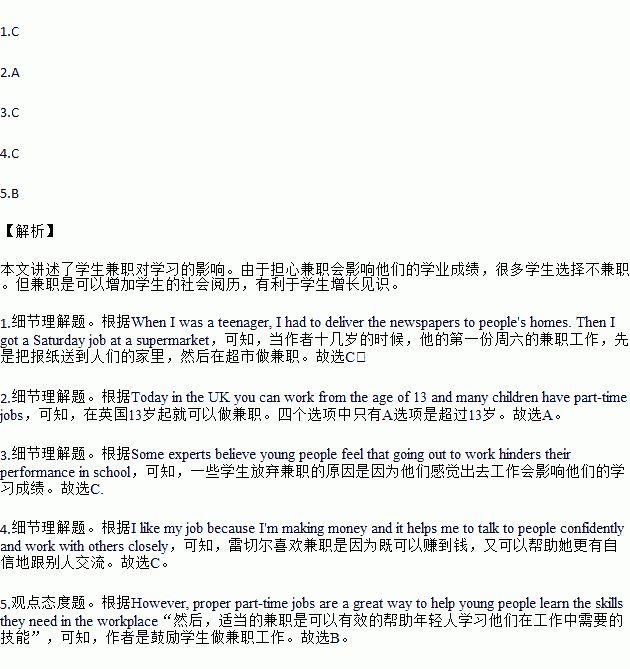题目内容

When you're in school, the last thing you want to do is to work on weekends. There's homework to do, sports to play, fun to have. But our parents may persuade(劝说) us to find a job to earn money and get some life experience. When I was a teenager, I had to deliver the newspapers to people's homes. Then I got a Saturday job at a supermarket: putting everything in order on the shelves and working as a shopkeeper.
Today in the UK you can work from the age of 13 and many children have part-time jobs. It is almost seen as an adult ceremony. It's an independent experience. Teenagers agreed that it taught them valuable lessons about working and managing money with adults. So that's not a bad thing!
Some research suggests that not working on Saturdays or holidays may be harmful to one's later life. But recent statistics(数据统计)show 20%of the students have given up having part-time jobs in the past three years.
So does this mean British teenagers are now more afraid of hard work? Probably not. Some experts believe young people feel that going out to work hinders(阻碍) their performance in school, they are now under more pressure(压力) to study hard, get good grades and have a good job in the long run. However, proper part-time jobs are a great way to help young people learn the skills they need in the workplace. In fact, the key is to keep a balance between taking a part-time job and having enough time to study and rest.
Many young people actually want to work because it gives them a sense of freedom. A 13-year-old girl named Rachel works in a shop on Saturday. She told the BBC: I like my job because I'm making money and it helps me to talk to people confidently and work with others closely. It seems like a valuable thing to do on a Saturday morning.
1.When I was a teenager, I ___________at first.
A.had too much homework to do B.played sports with my good friends
C.delivered newspapers to people’s homes D.had a part-time job on Saturday
2.Who can have a part-time job in the UK?
A.Gavin a 14-year-old boy B.Aron an 11-year-old boy
C.Loretta a 12-year-old girl D.Victoria an 8-year-old girl
3.What makes some students give up part-time jobs ?
A.They are now more afraid of hard work.
B.Taking part-time jobs may be harmful to their later life.
C.Going out to work hinders their performance in school.
D.Taking part-time jobs isn’t a great way to help them learn skills.
4.Rachel likes her part-time job because ___________
① She can make some money.
② She can get good grades.
③ It helps her talk with people confidently.
④ It helps her get away from pressure.
A.①② B.③④ C.①③ D.②④
5.The writer’s purpose in writing the passage is___________
A.To introduce his own part-time job experience.
B.To encourage students to take a part-time job.
C.To tell students how to keep a balance between study and jobs.
D.To make a survey on part-time jobs.

